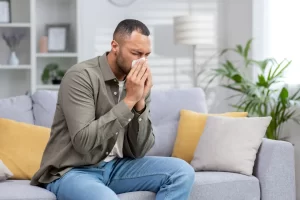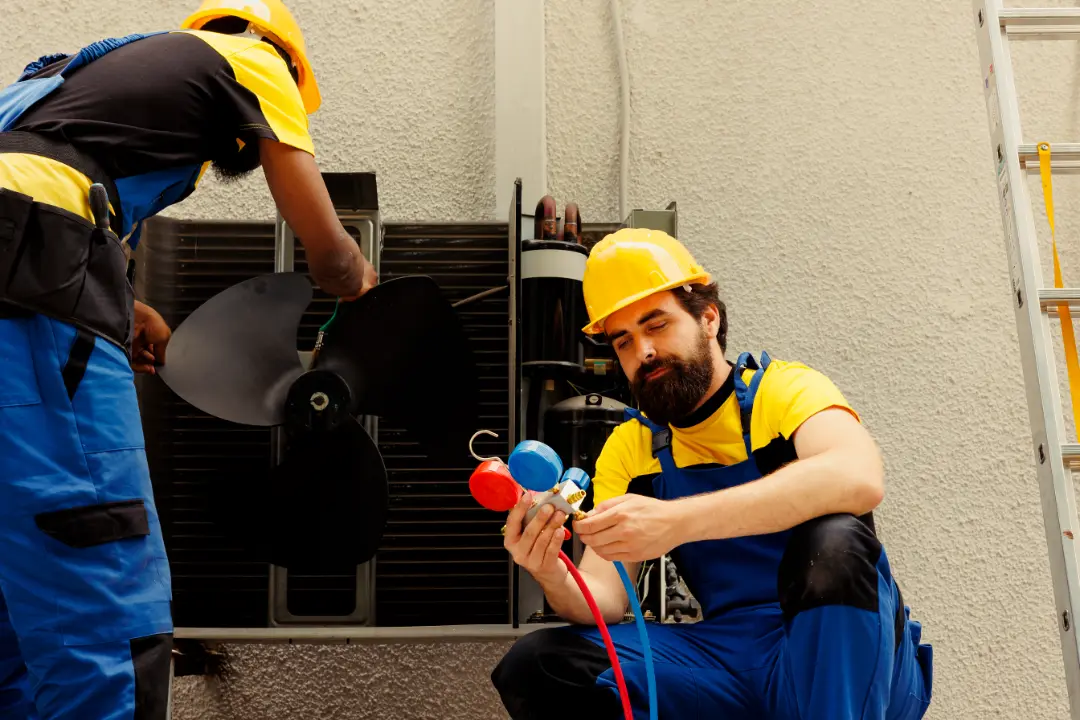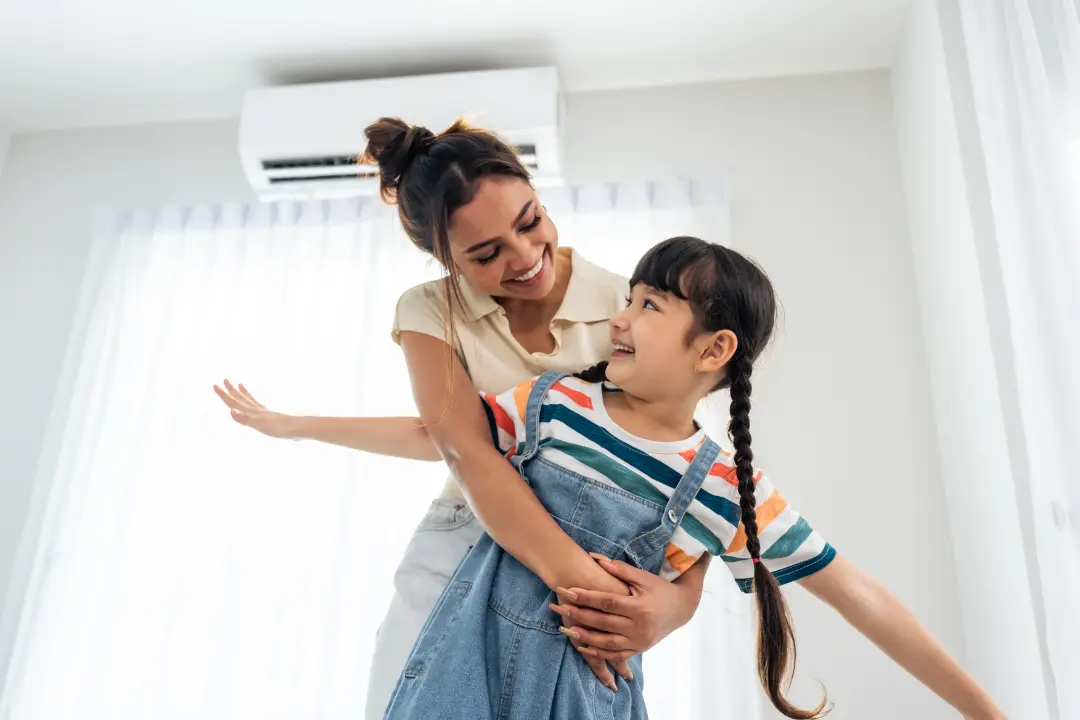Do you find yourself constantly sneezing and sniffling during the fall season? That could be fall allergies.
For many, allergies ruin the enjoyment of autumn, turning what should be a pleasant time into a struggle with symptoms. It is, however, possible that your HVAC system could provide some relief.
In this post, we will provide actionable tips on how to prevent fall allergies with your HVAC system to maintain pure and healthy air in your living space during autumn.
Key Takeaways
- Regular HVAC maintenance, the use of proper air filters with MERV ratings between 9 and 12 or HEPA filters, and controlling indoor humidity levels are crucial for reducing fall allergies in the home.
- Ensure your home breathes as easily as you do this fall. Smartway Air Conditioning provides comprehensive HVAC maintenance in Sydney, expertly tackling allergens with deep cleaning, filter replacement, and duct inspection.
- In addition to HVAC management, creating an allergen-free home environment involves regular cleaning with tools like HEPA-filter vacuums, minimizing outdoor allergen infiltration, and managing pet dander through frequent grooming and creating pet-free zones.
- Innovative solutions such as UV light purification systems, whole-home air purifiers, and smart thermostats can significantly improve indoor air quality and reduce allergy symptoms during peak allergy seasons.
How to Prevent Fall Allergies With Your HVAC System
Your HVAC system is more than just a temperature regulator. It’s your first line of defence against fall allergies.
As air circulates through the HVAC system, proper filtering is essential to remove contaminants and allergens, preventing them from recirculating in your home. This can significantly reduce your contact with common allergens. This can be a game-changer for allergy sufferers, transforming your home into a sanctuary free from sneezes and sniffles.
But how can you harness your HVAC system’s power to fight against fall allergies?

1. Do Seasonal Maintenance Checks
Regular maintenance checks are crucial to keeping your HVAC system in top condition and providing you with the cleanest indoor air possible.
Regular maintenance also helps your HVAC system work efficiently, ensuring optimal air quality and allergen reduction. Preventive maintenance can help you manage costs while maintaining optimal air quality.
2. Choose the Right Air Filter for Your HVAC System
The air filter is the heart of your HVAC system and is responsible for trapping pollutants and allergens. Filters trap airborne allergens and harmful particles such as dust, pollen, mould spores, and pet dander, preventing them from circulating indoors.
To effectively filter out common allergens like dust, dander, and pollen, it’s recommended to use air filters with a MERV rating between 9 and 12.
A HEPA filter might be better for those with severe allergies and respiratory issues. These filters are standardised for their high efficiency in trapping particles that exacerbate allergy symptoms. Advanced air filter systems that remove particulate matter from indoor air can offer significant health benefits for these individuals.
While it is important to choose the right filter, regular filter maintenance is crucial if you want it to keep protecting your home from airborne particles. Changing your HVAC filters regularly can minimise indoor allergens.
3. Maintain Good Humidity Control
Maintaining indoor humidity levels below 50% is essential for managing allergies.
High humidity can lead to mold growth, especially in damp areas like basements and bathrooms, which can trigger allergic reactions such as itchy eyes. This is because allergens like dust mites and mould thrive in moist environments.
To achieve optimal humidity levels, it’s recommended to keep indoor temperatures between 68°F (20°C) and 72°F (22°C) with relative humidity no higher than 50%. You can use dehumidifiers to keep humidity levels in check, effectively hindering the growth of allergenic mould.
How to Establish Clean Air Inside Your Home
Establishing a clean-air sanctuary inside your home is a multifaceted task. Generally, it involves regular cleaning, the use of high-efficiency filters, and keeping indoor pollutants to a minimum.

Practice Regular Cleaning Habits
Establishing regular cleaning habits in your home to maintain a clean and healthy environment is important. Vacuuming, dusting, and mopping regularly can significantly reduce allergens and prevent the accumulation of dust, pollen, and pet hair. However, it’s essential to use the right cleaning tools and techniques.
Using a vacuum cleaner with a HEPA filter twice a week is an effective way to trap dust particles and germs, which can help reduce the amount of allergens in your home.
When dusting surfaces, use a damp cloth, such as a microfiber cloth, instead of a dry cloth. A damp cloth is more effective at removing dust and helps improve indoor air quality by preventing dust from becoming airborne.
Washing your bed linens in hot water once a week can help eliminate allergens such as pet hair, dust particles, and pollen. In addition, it’s important to minimise moisture in your bathroom to prevent the growth of mould and mildew, which can trigger allergy symptoms.
Keep the Outdoors Out
While we love the great outdoors, it can sometimes bring unwanted guests into our homes – allergens. Fall allergens like ragweed pollen and mould can easily enter your home during high pollen seasons, leading to fall allergy symptoms.
Installing double-paned windows and keeping them closed during pollen season can help prevent outdoor allergens like pollen from infiltrating your home.
It’s particularly important to:
- Close windows during high pollen counts
- Utilise air conditioning or air purifiers to reduce the entry of pollen and other allergens
- Be aware of pollen forecasts and choose to stay indoors when pollen counts spike
- Use air conditioning during warmer weather to control dust mites and maintain lower humidity levels inside, reducing the potential for outdoor allergens to enter.
Pet Dander Management
If you’re a pet owner, you know that pets can sometimes bring allergens into your home. Brushing and bathing pets more often, especially during allergy season, can limit the spread of allergens.
You can also create pet-free zones, especially in areas like the bedroom, to significantly reduce the presence of pet dander. Wiping down pets’ paws after they have been outside can reduce the amount of pollen and other allergens they carry into the house.
Innovative Solutions to Improve Indoor Air Quality
Indoor air quality is crucial for our well-being; sometimes, we must think beyond traditional methods to achieve it. Luckily, there are several indoor air quality equipment that can help improve the quality of indoor air.
UV Light Purification Systems
UV light purification systems are effective tools in combating allergens. By adding ultraviolet light to HVAC systems, the air can be sanitised by eliminating harmful microorganisms like mould, bacteria, and viruses. This leads to improved indoor air quality and a reduction in the spread of airborne illnesses.
Professional installation of HVAC UV air purifiers can significantly reduce allergens by killing up to 99% of microorganisms within the system. This means that you can enjoy a more comfortable living environment, especially during allergy season, with less sneezing and other allergy symptoms.
Whole-Home Air Purifiers
Whole-home air purifiers and air cleaners provide extra protection against allergens. They work alongside HVAC systems to improve air filtration throughout every space in the house, catching finer particles than standard HVAC filters.
These purifiers use medical-grade HEPA filtration, which can reduce airborne pollutants, such as smoke, pollen, and dust, by up to 95%. Their design separates the fan from living areas, so they operate quietly, even at their highest settings.
Investing in a whole-home air purifier that uses a HEPA filter is more cost-effective over time than buying multiple portable air purifiers for each room.
Smart Thermostats for Optimal Air Quality Control
Smart thermostats are not just fancy gadgets. They can improve indoor air quality by regulating air filtration devices and maintaining a clean indoor environment.
Importance of Regular HVAC Maintenance
Regular maintenance of your HVAC system will help to extend the life of the furnace, potentially from 10 years to up to 15-25 years. Regular maintenance can also prevent breakdowns and improve energy efficiency, ensuring that the HVAC system operates smoothly.
Regular inspections allow you to identify small issues before they become bigger problems and prevent costly repairs. It is recommended that annual inspections be performed for heating systems in the fall and air conditioners in the spring, which aligns with the seasonal demands.

Breathe Cleaner This Fall with Smartway HVAC Maintenance in Sydney
When allergies strike with the fall breeze, your HVAC system should be your shield and not a hidden source of symptoms. At Smartway Air Conditioning, we provide comprehensive HVAC maintenance in Sydney that helps Sydney residents breathe easier, season after season.
With over 30 years of hands-on experience, our certified technicians go beyond routine checkups. We provide deep cleaning, filter replacement, duct inspection, and lubrication of moving parts for your home or business.
We are committed to delivering long-term value. Our affordable pricing, reliable service, and 24/7 availability make us the most trusted name for your HVAC care. Contact us today.
Lifestyle Adjustments for an Allergy-Friendly Environment
Some lifestyle adjustments can help combat and prevent fall seasonal allergies. Below are some things you should do:
Allergy-Proof Your Home
Allergy-proofing your home can be effortless if you take simple steps that can make a significant difference. For example, you can use allergen-proof bedding and tightly woven covers on mattresses and pillows to protect against allergens like pollen, bacteria, and dust mites. Also, keeping allergy medication readily available can help manage symptoms when they arise.
To get rid of dust mites, wash your bedding, including uncovered pillows and stuffed toys, in hot water regularly. This should be done weekly. Furthermore, choosing hard surfaces such as hardwood or linoleum flooring over carpeting and selecting less heavy wall drapes can significantly reduce the presence of dust and allergens in the home.
Ensure Adequate Ventilation
It’s important to maintain good indoor air quality and prevent the accumulation of allergens. To achieve this, proper ventilation is crucial. Exhaust fans installed in bathrooms help control humidity and reduce the likelihood of mould growth, which is a common trigger for allergies.
Similarly, using vented exhaust fans in kitchens can minimise moisture and eliminate cooking fumes, preventing potential allergens from lingering indoors.
Frequently Asked Questions
How can I use my HVAC system to combat fall allergies?
Take care of your HVAC system by scheduling regular maintenance, using the right air filter, and effectively controlling indoor humidity to combat fall allergies. Regular maintenance, the proper air filter, and humidity control are key to using your HVAC system to combat fall allergies.
What are some ways to establish a clean-air sanctuary at home?
To establish a clean air sanctuary at home, focus on regular cleaning, keeping outdoor allergens out, and managing pet dander. This will help create a healthier indoor environment for you and your family.
What are some innovative solutions to improve indoor air quality?
Some innovative solutions to improve indoor air quality include UV light purification systems, whole-home air purifiers, and smart thermostats. These technologies can effectively enhance the air quality in your home.
What services does Smartway Air Conditioning offer to combat fall allergies?
Smartway Air Conditioning offers customised HVAC maintenance. This service can help improve indoor air quality and reduce allergens in your home.
Conclusion
Fall allergies can be effectively managed by utilising your HVAC system, creating a clean air sanctuary at home, implementing innovative solutions to improve indoor air quality, and making certain lifestyle adjustments. These strategies will help you enjoy the fall season without worrying about allergy symptoms.
It’s important to remember that while fall allergies can bring discomfort, there are ways to transform your home into an allergy-free sanctuary. Arm yourself with these HVAC tips and strategies, and get ready to fully enjoy the fall season. If you need expert HVAC maintenance, don’t hesitate to contact us for a free quote.


